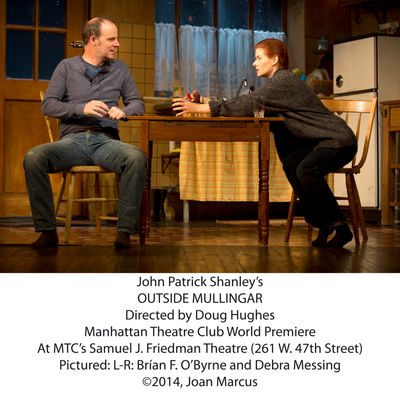
John Patrick Shanley, despite that name, has devoted much of his career to dramatizing the lives of Italian-Americans, most notably in his screenplay for Moonstruck. The Irish, he told the Times, “I never wanted to write about.” It wasn’t until a 1993 visit to the farm on which his father was raised that he began to think about his own people as subjects, and even then it took twenty years. But to judge from the evidence of the charming but phony play that eventually resulted — Outside Mullingar, at the Manhattan Theater Club — he never actually made it to Ireland. He seems to have gotten only as far as the Irish Rep on 22nd Street. Or the Atlantic on 20th. Or any of the other theaters in New York that keep the tradition of Irish literature, and sometimes blarney, alive on their stages.
This isn’t entirely a bad thing; Outside Mullingar is comforting in its theatrical familiarity. On the packing list of required elements, no item is left unchecked. Irish-ish stars? Sure: The production is headed by Brían F. O’Byrne (born in County Cavan) and Debra Messing (hey, she’s got red hair). Dank setting? John Lee Beatty’s scenery looks like it was dredged from a peat bog. An old Hibernian air? Please join me in singing “Wild Mountain Thyme.” Everything, including the kitchen sink, screams Ireland as we know it from plays great and small: the wellies, the crucifix, the rain, the mad stories, the fierce colleen, the crafty old man, the wake, the Guinness, the touch of the poet. It begins with a yarn and is itself a yarn.
Alas, it’s a yarn that unravels as quickly as Shanley can knit it. Two households, both alike in indignity, are the subject. Over at the Reillys’, old man Tony (Peter Maloney) does not plan to leave the family farm to Anthony (O’Byrne), his hardworking son, because Anthony is cursed in some way that will not be revealed until the last scene. We do know that he is resigned to joylessness and the dead weight of emotions. (“A man with feelings should be put down,” he says sadly.) Meanwhile, next door at the Muldoons’, daughter Rosemary (Messing), who dislikes the life, is set to inherit their family farm when her mother (Dearbhla Molloy) passes. Rosemary, first seen smoking a pipe, is a Free Spirit, refusing to observe the feminine (or even the human) niceties. Still, she has been in love with Anthony since she was 6, and is playing a very long game.
In lengthy, looping scenes (though the play runs only 95 minutes) Shanley maintains a fairly constant level of enjoyability. The characters, despite their universal dourness, are unnaturally funny; despite their ripe-for-parody Oirish poesy (“He had the blood of kings in him”), they seem to have learned to talk in the Catskills. (“Your mother would die again if she saw the state of this house.”) Sometimes the jokes arrive so punctually, and in such tick-tock alternation with colorful invective, you feel like you’re watching a breezy non-rom-com: Will and Begorrah. Shanley apparently lives for repartee, no matter whether it makes larger sense or contradicts itself later in the same argument. (The play is all argument.) To the extent people are really like that, Outside Mullingar is both fun and revealing.
But that’s not all people are, so it’s an annoyingly twisty road from the play’s opening to its meaty climax, when Anthony and Rosemary finally have their showdown. Here, Messing, who works too hard in her first scenes to organize an incoherent character, really blossoms; she is natural, tender, and beautifully vulnerable. For a moment, the promise of romantic comedy — the transfiguration of a fully realized sorrow — is delivered. But just as Shanley seems ready to tear the play open, he makes a shocking error in judgment. Anthony’s big, dark secret is revealed, and it’s so ludicrous that it undermines all the beautiful work O’Byrne has done to create a dignified and sympathetic character from materials that, in other hands, might have resulted in an insufferable prig. Neither he nor the story can recover; rather, the interlocking O. Henry devices snap shut and the play disappears in the process.
It’s a cryin’ shame, as the stage Irish say, because a lot of craft is wasted. Not just the cast’s (Maloney and Molloy are also excellent) and the director’s. (Doug Hughes keeps the surface polished so most of the time you don’t bother with what’s underneath.) Shanley’s craft is wasted too. As we know from Doubt and even Moonstruck, he’s not afraid to build actual plot from the tangible complexities of human interaction. (You could look at Outside Mullingar as a real estate drama.) Big questions don’t cow him, either; the play is at its best when it puts its existential concerns plainly. (“Is a man who does what he must though he feels no pleasure,” Anthony asks, “less of a man than one who’s happy?”) And the jokes almost always pay off, even the numerous variations on “how insane was he?” (My favorite is the guy who “put his own dog on trial for slander.”) Indeed, there’s not much to dislike about Outside Mullingar except its entirety. The individual scenes go like gangbusters; they will be used in acting classes for decades. Just not in playwriting classes.
Outside Mullingar is at the Samuel J. Friedman Theatre through March 16.




